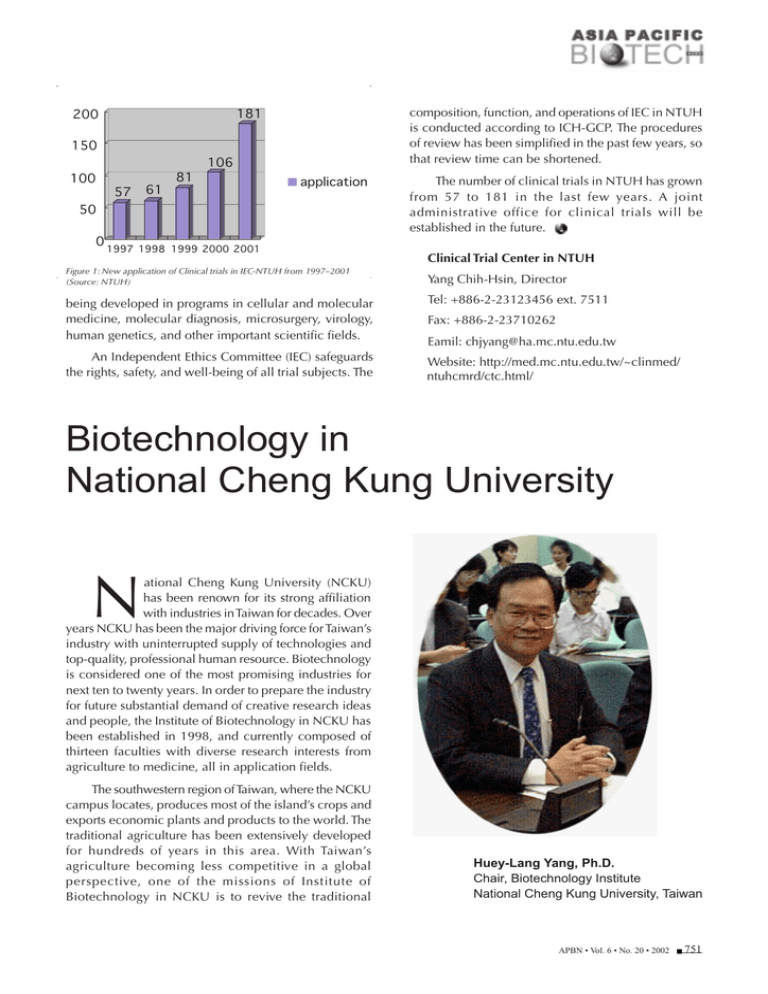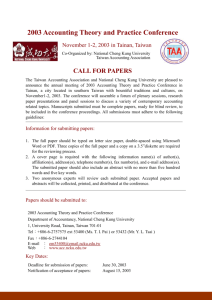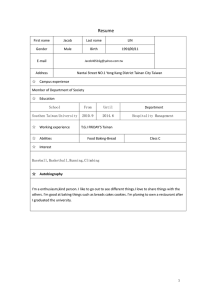Biotechnology in National Cheng Kung University
advertisement

composition, function, and operations of IEC in NTUH is conducted according to ICH-GCP. The procedures of review has been simplified in the past few years, so that review time can be shortened. 181 200 150 106 81 100 57 61 application 50 0 1997 1998 1999 2000 2001 Figure 1: New application of Clinical trials in IEC-NTUH from 1997–2001 (Source: NTUH) The number of clinical trials in NTUH has grown from 57 to 181 in the last few years. A joint administrative office for clinical trials will be established in the future. Clinical Trial Center in NTUH Yang Chih-Hsin, Director being developed in programs in cellular and molecular medicine, molecular diagnosis, microsurgery, virology, human genetics, and other important scientific fields. Tel: +886-2-23123456 ext. 7511 An Independent Ethics Committee (IEC) safeguards the rights, safety, and well-being of all trial subjects. The Website: http://med.mc.ntu.edu.tw/~clinmed/ ntuhcmrd/ctc.html/ Fax: +886-2-23710262 Eamil: chjyang@ha.mc.ntu.edu.tw Biotechnology in National Cheng Kung University N ational Cheng Kung University (NCKU) has been renown for its strong affiliation with industries in Taiwan for decades. Over years NCKU has been the major driving force for Taiwan’s industry with uninterrupted supply of technologies and top-quality, professional human resource. Biotechnology is considered one of the most promising industries for next ten to twenty years. In order to prepare the industry for future substantial demand of creative research ideas and people, the Institute of Biotechnology in NCKU has been established in 1998, and currently composed of thirteen faculties with diverse research interests from agriculture to medicine, all in application fields. The southwestern region of Taiwan, where the NCKU campus locates, produces most of the island’s crops and exports economic plants and products to the world. The traditional agriculture has been extensively developed for hundreds of years in this area. With Taiwan’s agriculture becoming less competitive in a global perspective, one of the missions of Institute of Biotechnology in NCKU is to revive the traditional Huey-Lang Yang, Ph.D. Chair, Biotechnology Institute National Cheng Kung University, Taiwan APBN • Vol. 6 • No. 20 • 2002 751 www.asiabiotech.com agriculture with a touch of modern biotechnology. In collaboration with nearby agriculture-related research organizations, such as Asian Vegetable Research & Development Center (AVRDC), Taiwan Sugar Research Institute, Taiwan Livestock Research Institute, Tainan Agricultural Improvement Station and Taiwan Fisheries Research Institute, several inter-campus research teams are formed to study plants, poultries, livestock and aquaculture in genetic levels. Transgenic applications are the focus of those studies. Some research topics in the agriculture category are as followed: Fish Vaccine – Dr. Huey-Lang Yang The theme of Dr. Yang’s research activity is concentrated on exploring the immune mechanism and the development of vaccine for Taiwan important farm fish, such as grouper and cobia. Molecular methods are employed to analyze the development process of immune system, from embryonic to the larvae stage of fish. Understanding the maturation of immune system in multiple dimensions helps perfecting the vaccination program. Several bacterial and viral vaccine products have been developed, and among them the Nervous Necrosis Virus (NNV) vaccine is already in testing stage. Oral vaccination technology is another crucial breakthrough of this lab, cutting down cost and raising the survival rate of fish finglings significantly. artificial incubation of treated embryos. These techniques will be applied in next three years to develop the gene transfer technology of chickens. First is the production of germline chimeric chickens from transfer of blastodermal cells in Stage X eggs between White Leghorn and Native chicken. Secondly the in vivo electroporation of chicken blastodermal cells with GFP marker gene to develop the methods of introducing foreign DNA through in vivo electro poration of chicken germ cells. Sugar Signal Transduction and Regulation in Plants – Dr. Su-May Yu Sugar signal transduction and regulation of gene expression are central control mechanisms that mediate energy homeostasis, carbohydrate distribution, and growth and development of plants. The focus of our study is to identify components in the sugar signal transduction pathway and to study the interactions between the cis-regulatory promoter elements and the transcription factors for sugar regulation. Three novel transcription factors have been identified; they mediate sugar and hormonal regulation of gene expression. Another discovery is a protein kinase involved in sugar signal transduction pathway. We have also found transcriptional enhancers direct sugar- and hormonedependent and tissue-specific expression of promoters in transgenic rice. Production of Transgenic Poultry – Dr. Chein Tai Protein Engineering using Baculovirus – Dr. Yu-Chan Chao The development of non-viral methods for producing transgenic poultry has been studied since 1999 in Dr. Tai’s laboratory. The first approach for the generation of transgenic poultry has been the production of germline chimera by transfer of primordial germ cells (PGCs). In order to study the molecular mechanisms of baculovirus gene expression and how the virus can better express a foreign protein, our efforts were divided into two aspects. The first aspect is to promote strong early expression of foreign proteins. The second aspect is the establishment of the nonlytic baculovirus expression vector system to improve both the purification process and the quality of the engineered proteins using baculovirus. Besides the germline chiremic ducks obtained in these studies, some technologies of transgenic poultry have been established in past two years in this laboratory through the conduction of the projects of “Production of germline chimeric ducks by transfer of primordial germ cells” and “Long-term proliferation and transfection efficiency of duck primordial germ cells”. They are the isolation, purification, and short-term culture of PGCs, as well as the microinjection of duck embryos, electroporation of PGCs with GFP-gene, and 752 APBN • Vol. 6 • No. 20 • 2002 Fish Vaccine – Dr. Tzong-Yueh Chen The research of Dr. Chen’s laboratory has focused on two projects: 1) using Pseudomonas exotoxin A (PE) to develop vaccines and DNA delivery system; 2) studying genomics and functional genomics for aquaculture fish and their pathogens. A novel receptor-mediated gene delivery system has been developed. Based on the known functional property of each Pseudomonas exotoxin A (PE) domain and human DNA Topo I, the receptor binding and membrane translocation domains of PE was fused with a highly positively charged DNA binding region of the N-terminal 198 amino acid residues of human DNA Topo I. The results showed that this DNA delivery protein was a general DNA delivery vehicle without DNA sequence, topology, and cell-type specificity. The DNA delivery protein could be used to target DNA into fish cells for the DNA vaccine delivery. Another research focus is biomedical-related study. Covering several disciplines in tissue engineering, cardiovascular disease, cancer studies, drug design, herbal medicine, the strong engineering background and experiences of NCKU particularly provide a solid base for the development of biotech-specific equipments and experimental methods. NCKU together with its university hospital own one of the three national new drug clinical trial centers and a top-grade animal laboratory. Three topics of the biomedical category are introduced here: Biomaterials and Tissue Engineering – Dr. Lynn L. H. Huang Dr. Huang’s laboratory aims on the development of porous scaffolds for tissue engineering and related biomedical subjects. Some achievements include the developments of collagen-hyaluronan wound dressings, novel genipin-gelatin biological adhesives, collagen patches and microspheres for controlled drug delivery, a simple quantified method for collagen by capillary electrophoresis, etc. Currently, the non-contractible porous collagen — glycosaminoglycan scaffolds either from purified materials or directly from connective tissues were established and are in the process of patent applications. The interaction of various cells with the scaffold materials and the incorporation of some angiogenic factors as well as morphogens in the scaffolds are under investigation. for therapeutic purpose. Currently, two novel proteins have been constructed and expressed. One is the human prourokinase mutant that can selectively lyse pathogenic blood clot and the other is an angiostatin analog which is more potent than angiostatin in its anti-angiogenic activity. Evaluation of the in vivo activities of these two proteins is in progress. In addition, the lab is recently developing protein chips for proteomic research and drug screening. The special feature of the protein chips is retaining the activity and proper orientation of the proteins immobilized on chip. Protein Structure – Dr. Mei-Fen Jeng The laboratory of structural biology has aimed on investigation of disease-related (asthma-related) proteins and genes using proteomic, molecular biology, and spectroscopic strategy. It has also interest in structure determination and is studying structure-function relationship of proteins using nuclear magnetic resonance spectroscopy, computer simulation and modeling. Through the threedimensional structures of these disease-related proteins and/or their complexes, the structure-based rational drug design will be conducted to develop therapeutic agent to treat disease. The idea of this mission-oriented research institute is to create continuous research power for Tainan Science-based Industrial Park (TNSIP) and Tainan Technology Industrial Park (TTIP), where most biotechnology companies and laboratories will be located in near future. These two science parks are designed specifically to host biotechnology companies, and well equipped with from standard facilities to animal labs to field labs. National Cheng Kung University No.1, Ta-Hsuieh Rd, Tainan City, Taiwan Tel : +886-6-2757575 Fax : +886-6-2766505 Biopharmaceutical Research Laboratory – Dr. Shyh-Yu Shaw http: //www.ncku.edu.tw/~biotech/ The research interest is focus on the development of biopharmaceutical products especially using CHO cell expression system to express recombinant proteins APBN • Vol. 6 • No. 20 • 2002 753



